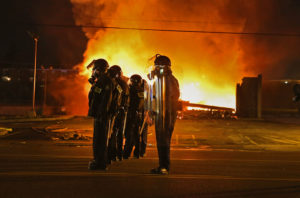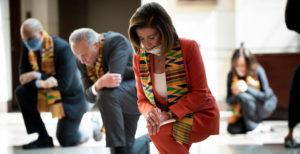A perfect rerun of the political battles of the Trump presidency is being fought in the January 6 House Select Committee hearings. On one side is Trump, guilty of idiocy, egregious lack of judgment, indifference to constitutional norms, and of pursuing — but coming nowhere close to carrying out — an absurd scheme to undo the 2020 election results. On the other side are his opponents on the committee and their allies in the media, engaged in what they claim is a noble defence of democracy but what is, in most cases, run-of-the-mill partisan warfare.
A basic story emerges from the hearings. The headline is that Trump’s legal attempts to overturn or otherwise invalidate the results of the 2020 election, culminating in his supporters’ storming of the Capitol on January 6, amounted to an “attempted coup” meant to “overthrow the U.S. government,” in the words of committee chairman Bennie Thompson.
Chatter about a “coup”, however, is mostly a question of semantics. For all the focus in the hearings on the Trump team’s inane plans to block Biden’s election victory — a draft executive order (never issued) calling on the Department of Justice to seize voting machines, a draft DOJ letter (never sent) alleging election irregularities in Georgia, lawyer John Eastman’s theory that Mike Pence had the Constitutional authority to toss out the results — the actual crime the committee is trying to pin on Trump is “incitement” of a riot, rather than “seditious conspiracy” or some other charge befitting an attempt to overthrow the government. Hence the focus of last Tuesday’s hearing on Trump’s tweets, which, the committee claimed, convinced his extremist supporters that the president wanted them to commit violence in his name.
But while Trump’s rhetoric was irresponsible, incitement is a difficult crime to prosecute thanks to the First Amendment. Trump never directly ordered anyone to storm the Capitol, so he is likely in the clear, legally if not morally. Indeed, the committee’s purpose is probably less to fish for criminal charges than to put Trump and the events of January 6 back at the centre of the national conversation at a time when the Democrats are facing political headwinds. As the New York Times reported shortly before the hearings started, “Democrats argue the hearings will give them a platform for making a broader case about why they deserve to stay in power.” The article quoted a political consultant who had run focus groups on Democratic “base surge voters” and “swing voters” and found that for both groups, “Jan. 6 is very much salient and highly negative.”
And for everyone else? According to a recent Harvard/Harris poll, while narrow majorities blame Trump for the Capitol riot, narrow majorities also regard the hearings as “partisan” and “biased”, 56% believe the Capitol riot was a “protest that turned violent” (versus 44% who think it was an “armed insurrection”), 63% believe Congress should be investigating other issues rather than focusing on January 6, and 67% believe the hearings are “further dividing the country”. (For what it’s worth, 61% of voters would prefer that Trump not run again in 2024.) Partisan splits on all of these questions are what you’d expect, with most of the margin accounted for by independents.
The committee’s main problem is that it is an entirely one-sided affair, which means that it is having trouble convincing anyone who is not already convinced. Normally, a House select panel would include members of the minority party who could ask questions, cross-examine witnesses, and generally challenge the assertions of the majority. This committee does have two Republicans, but both were selected by Nancy Pelosi for their anti-Trump bona fides. The majority of House Republicans boycotted the committee — unwisely — when Pelosi refused to seat two of their nominees on the grounds that both had objected to the certification of the 2020 election (something they have in common with Democratic committee member Jamie Raskin, who objected to certification in 2016.)
Absent any opposition, the committee has been an odd mix of Congressional hearing and partisan political documentary. I mean the second part literally: the committee recruited a television executive, former ABC News President James Goldston, to craft the hearings into a “disciplined, captivating summer series” built around a “taut, colourful narrative with a prosecutor’s precision and a cinematographer’s flair”, according to Axios’s Mike Allen. While the committee has deposed hundreds of witnesses, their testimony has been released only in scripted appearances before the panel, carefully curated video snippets, and leaks to friendly media. No transcripts have been made available to the public, and so the committee releases only the information that appears to bolster its narrative while ignoring the rest, safe in the assumption that criticism will mostly be confined to the Right-wing press.
The flaw in this arrangement was on display over the past two weeks. Take the testimony of Cassidy Hutchinson, a former aide to Trump chief of staff Mark Meadows who accompanied the former president and many of his top aides on January 6. Hutchinson’s testimony was undoubtedly damaging to Trump, painting him as furious and out of control on the day of the riot. However, some of her more explosive and widely circulated allegations — for instance, that Trump attempted to grab the wheel of his limo and “lunged” at a Secret Service officer when informed he couldn’t go to the Capitol — were immediately contradicted in the press by the Secret Service agents themselves, who had also been interviewed by the committee. Who is telling the truth? We have no idea — the testimony of the agents has not been made public, and no Republicans were present to cross-examine Hutchinson. All we have is committee member Adam Kinzinger calling one of the Secret Service agents a liar on Twitter.
The second big problem, related to the first, is that the period between the election on November 2, 2020 and the Capitol riot on January 6, 2021, is impossible to understand in isolation from the events of the previous four years. There are the familiar scandals related to Trump, most notably Russiagate, in which bogus opposition research from the Clinton campaign (much of it sourced from a liberal think tank employee in Washington, D.C.) became the basis for FBI spying, the years-long Mueller probe, and a media-hyped conspiracy theory about Trump-Russia “collusion”. Then there were the racial-justice protests and riots of the summer of 2020, tacitly tolerated and sometimes explicitly endorsed by Democrats, which caused some $1 billion in property damage, at least 25 deaths, and catalysed a nationwide spike in homicides. None of these justify what happened on January 6th, but it is obtuse to ignore the climate of hyper-polarisation and civil unrest in which January 6th occurred — voters likely won’t.
There is also the simple matter of hypocrisy surrounding the 2020 election. The committee has focused relentlessly on Trump’s baseless accusations of voter fraud in an attempt to prove the president was attempting to steal an election he knew he had lost — a theory that recently received some circumstantial support from leaked audio of Steve Bannon. But it has also sought to elide the difference between Trump’s harebrained schemes and other Republican criticisms, which are all folded in under the category of the “Big Lie” and “election denial”.
This is, for the most part, cheap posturing. Relative to other advanced democracies, the United States has fairly chaotic and decentralised elections — a 2019 report from Harvard’s Election Integrity Project ranked US elections alongside those in Mexico and Panama. Candidates of both parties frequently challenge the results of close elections in court and deny the legitimacy of elections when they lose, even if they ultimately concede. Hillary Clinton, for one, famously called Trump an “illegitimate president” and claimed that he had “stolen” the 2016 election from her. In August 2020, she urged that in the event of a close election, “Joe Biden should not concede under any circumstances.”
The 2020 election was even more chaotic than usual. Elections that spring had been plagued by irregularities, as well as technical and administrative failures. In February, prior to the pandemic, the Iowa Democratic caucuses suffered a counting meltdown that denied Bernie Sanders a clear-cut victory. A May city council election in Paterson, New Jersey had to be invalidated after it was discovered to be “rife with mail-in vote procedural violations.” In June primary elections, Georgia’s new voting system failed disastrously due to a combination of technical problems and administrative incompetence, prompting Democrats, including Clinton, to allege a state Republican plot to suppress the Democratic vote. Many states were operating under politically contentious new voting rules that had been improvised in response to the pandemic and were, in some cases, later deemed illegal.
No dramatic cases of fraud or administrative disaster occurred on November 2, although there were some minor errors sprinkled across the country. There were also things that were not exactly illegal but which gave at least an impression of impropriety — for instance, the coordination of Facebook, Twitter, major media outlets, and members of the defence and intelligence community in censoring embarrassing but true reporting about Hunter Biden; or the use of over $330 million in grant money from Mark Zuckerberg to fund election administration in heavily Democratic-leaning areas of major swing states.
None of this is to say that the 2020 election was “stolen” or that Joe Biden is not the legitimate president. However, it is to say that electoral dirty tricks, media echo chambers, partisan mistrust in the “democratic process”, accusations of illegitimacy and fraud, conspiracy theories, and legal challenges to election results are all the normal stuff of American politics, indulged by members of both parties as the needs of the moment suit. They are all the more likely in an atmosphere as fractious and chaotic as the United States in the fall of 2020, when neither side would trust the other an inch.
What made Trump’s behaviour in the aftermath of the election so remarkable was not that he challenged the legitimacy of the results or sought to pursue his options in court — it was that after exhausting all of his conventional options, he sidelined his competent advisors, elevated cranks, and pursued a doomed but nonetheless destructive bid to hold on to power. If he’s not back in 2024, the January 6 hearings will have had little to do with it.
Disclaimer
Some of the posts we share are controversial and we do not necessarily agree with them in the whole extend. Sometimes we agree with the content or part of it but we do not agree with the narration or language. Nevertheless we find them somehow interesting, valuable and/or informative or we share them, because we strongly believe in freedom of speech, free press and journalism. We strongly encourage you to have a critical approach to all the content, do your own research and analysis to build your own opinion.
We would be glad to have your feedback.
Source: UnHerd Read the original article here: https://unherd.com/






